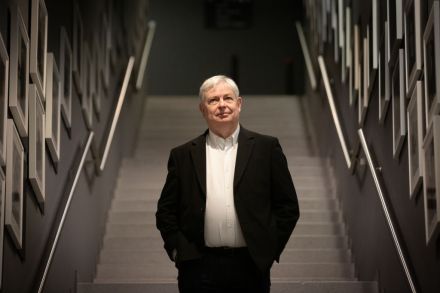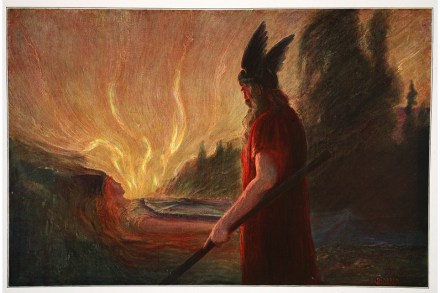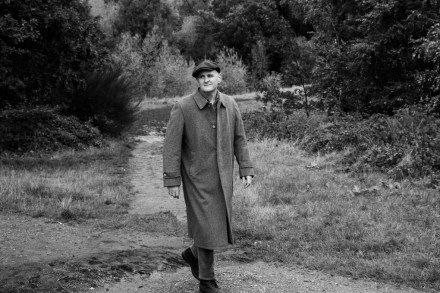The Book Club: Jonathan Coe
33 min listen
In this week’s Book Club podcast, my guest is Jonathan Coe, talking about cosy crime, the tug of nostalgia, the joys of satire, and his brilliant new novel, The Proof of My Innocence.

Our reviews of the latest in literature
33 min listen
In this week’s Book Club podcast, my guest is Jonathan Coe, talking about cosy crime, the tug of nostalgia, the joys of satire, and his brilliant new novel, The Proof of My Innocence.

Wagner’s Ring is an ambitious cycle of four operas relating world history from Primal Swirl to End of Days. It took 26 years to write, takes 15 hours to perform, a double-size orchestra to play and a specially built opera house to stage. Michael Downes, the director of music at St Andrews University, places the fons et origo of the epic in Wagner’s frustration as a kapellmeister, when he wrote, unsolicited, to his boss the King of Saxony, proposing a total revamp of the royal music scene. No reply was forthcoming. A second proposal was also blanked. Furious, Wagner flung himself into the Dresden uprising of 1848, financing the manufacture

The NYRB logo is now something my eye leaps to when browsing, and the publisher’s eclectic range has proved consistently rewarding. The Argentine writer Antonio di Benedetto was praised by Borges, Bolaño, Cortázar and Coetzee. He was born in 1922, on 2 November, the Day of the Dead – which he made much of – and was imprisoned and tortured in 1976-77, during Argentina’s Dirty War. His eerie fables of paranoia, impending threat and incomprehension pre-empted his experience of them. Esther Allen deserves great credit for introducing the author to an Anglophone readership. Having read her translation of Benedetto’s Zama, followed by The Silentiary, I foundthe wait for The Suicides

We know of the Durrells mainly through their own writings, outstandingly My Family and Other Animals, about their years in Corfu in the 1930s, and from the image of them created by TV and film adaptations of this work. Gerald and Lawrence were the best known members of the family, the first as a zoologist and conservationist, the second as an experimental writer. Their siblings, Margaret (Margo) and Leslie, will always be perceived through the lens Gerald turned on them in My Family – the former as a flighty eccentric, something like an extra from a Carry On film, the latter as a pantomime villain. Their mother, Louisa, was loved

The great parliamentary sketchwriter Quentin Letts, the Henry Lucy of our day, has described Sir Graham Brady (now Lord Brady) thus: ‘Were he a yacht, his galley would gleam, the decks would be scrubbed daily and there would be a large brass bell to summon matelots to morning parade. Commodore Brady runs a tight ship.’ After 27 years in the Commons, 14 of them as Chair of the 1922 Committee, the commodore has swapped his deck garb for ermine and written a kiss-and-tell about his political encounters with five Tory prime ministers. The 1922 Committee – the fabled men in grey suits who represent the parliamentary party’s backbenchers – is

Colour, the painter Patrick Heron once proclaimed, is a continent that artists have yet to explore. The mammoth two-volume The Book of Colour Concepts (Taschen, £150) catalogues numerous attempts to map this mysterious chromatic domain, from the late 17th century to the mid 20th. It quickly becomes clear that this area is infinitely vast. One only has to glance at the plates of the ‘Viennese Colour Cabinet’ (1794) – a whole column of blue-greens – to realise that. The effect of these technical diagrams is beautiful in the manner of abstract art. The illustrations from Goethe’s On Colour Theory (1810-12) could easily have been produced at the Bauhaus, while the


Fans of that beloved British cultural institution Doctor Who are wont to talk about ‘their’ doctor – that is, which iteration of the character was their entry point to the franchise. The same might be said of fans of Neil Innes, the much loved songwriter, musician and comedian who died in 2019, aged 75. Creating happiness seems to have been one of Innes’s gifts, in public as well as private In the 1960s, Innes was a key member of the exhilaratingly unpredictable Bonzo Dog Band, whose blend of verbal, musical and visual humour remains matchless in its absurdity, breadth and daring. He was the band’s de facto musical director, or,

You have been warned. First, David Butterfield has excoriated Cambridge University in these pages, leaving its standing devalued. Now Julian Stannard, a poet and novelist, delivers in fiction a devastating evisceration of other current universities. The University of Bliss belies its title. This is a work of high satire and Stannard vents his frustration with more than a touch of Swiftian saeva indignatio. His ridicule is extreme and addictively readable. The novel follows the career of the newly appointed vice chancellor Gladys Nirvana, partial to foot massages which transport her to regions signalled by her surname and give her acute sexual gratification. She is a renegade academic turned administrator, self-serving,

Who could forget the Polish squadrons in RAF Fighter Command when, in the 1969 film The Battle of Britain, a British squadron leader, frustrated by the excited radio chatter on being allowed into action at last, orders ‘Silence! In Polish!’ Or the Polish Parachute Brigade at Arnhem, whose commander, Stanislaw Sosabowski, played by Gene Hackman in A Bridge Too Far (1977), thinking the venture disastrous, growls ‘God Bless Field Marshal Montgomery’ as he jumps from his Dakota? Commander Eugeniusz Plawski, the captain of the Polish destroyer Piorun which first spotted the Bismarck and charged at her to draw fire, might be better known if he had featured in the 1960

Simon Jenkins has, over the years, assembled a winsome array of higher coffee-table books about the kind of building which welcomes National Trust mobility scooters and the beige brethren aboard them. This is a man who knows the cardigan market. And he knows his stuff, mostly. He subscribes to a version of the Great Man school of history, which casts the great man as an exigent client who believes himself the maker or author. But, sadly, the grim-faced Bess of Hardwick did not install the glazing herself. And another promoter ever anxious for an attribution, God Almighty, did not personally carve his supplicants’ chantries. It might be his house, but

No one joins the CIA for the money, which might explain the spate of thrillers now emerging from former officers. The latest addition, The Peacock and the Sparrow (No Exit Press, £7.99) by I. S. Berry, comes festooned with praise from other CIA officers turned authors. Set in Bahrain during the Arab Spring, the novel is told in the first person by Shane Collins, a veteran CIA officer nearing the end of his tour there. Divorced, estranged from his son and engaged in a desultory affair with the wife of a colleague, Collins is weary. As his source Rashid declares: ‘This is your problem. You have no expectations… You are
32 min listen
My guest in this week’s Book Club podcast is the novelist Nick Harkaway, whose new book Karla’s Choice sees him pick up the mantle of his late father, John le Carré, in writing a new novel set in the world of George Smiley. He tells me why, having spent a career trying to put clear blue water between his own work and that of his father, he’s now steering in the opposite direction; about growing up with Smiley; about his relationship with the man so many outsiders have seen as secretive and opaque; about seeking advice from Stephen King’s son, Joe Hill; and why moving from his own style to that of his dad

How can you break the mental manacles of an empire that has occupied not only your physical world but also your education, publishing, media, high culture and popular entertainment? In his endearing memoir of Odesa, Undefeatable, Julian Evans quotes the Ukrainian author Viktoria Amelina, who describes growing up in post-Soviet Ukraine surrounded by all things Russian. She attended a Russian school, acted in children’s Russian theatre, listened to Russian rock and prayed in a Russian Orthodox church: ‘There was an entire system in place that aimed to make me believe that Moscow, not Kyiv, was the centre of my universe.’ When she was 15, Amelina felt flattered to be invited

There’s only one Cincinnatus in the Cotswolds, and it’s not Boris Johnson. Over the Rainbow tells the story of how, once again, Alex James was torn from his life in a very big house in the country to fulfil his national duty to play bass with Blur. The tale comes in the form of a diary, like Brian Eno’s wonderful A Year with Swollen Appendices, except that this is a year with inflated egos. To make sure our sympathies are in the right place, it begins with a preamble at the end of December 2022, during which the author attends a series of parties, each more wearisomely smug than the

For those of us who have long loved (or hated) Paradise Lost, this is one of those rare and refreshing books that invites us to compare our feelings with other committed readers over the centuries. The poemmay well be the only major work in the western canon that nobody can avoid for long – even if it comes down to making a decision not to read it at all, or just to give up trying. Orlando Reade argues that it may also be the most ‘revolutionary’ text commonly available in modern classrooms – written by a man who, in his time, took extreme positions on everything from divorce (he was

Serious books about fatherhood are hard to come by; indeed, next to distinguished literary mothers such as Rachel Cusk, Sheila Heti, Jacqueline Rose, and Elena Ferrante, the male sex is beginning to look decidedly inarticulate. In his new, genre-blurring work Childish Literature, the Chilean novelist Alejandro Zambra seeks to right this imbalance. In doing so, he aims to correct the failings of prior male generations, who may have ‘tried, in their own ways, to teach us to be men’, but never quite ‘taught us to be fathers’. Before he became one of Latin America’s most inventive prose writers, Zambra was an acclaimed poet and, like many poet-novelists, he treats narrative

The path to National Treasureland is no paved highway. Simon Russell Beale, the finest classical actor of his generation, was nearly lost to academia (he swerved a PhD in Victorian literature), and faced down pigeon-holing from an agent who wanted to change his name to Simon Beagle, the better to capitalise on a knack for dopily jolly comedy roles. Now – and not before time – he’s written an elegant study of Shakespeare that does double duty as a juicy actor’s autobiography. The pleasure here is in the mix of green room gossip and literary insight. There’s plenty of the former: dining next to Lauren Bacall at the chat show


George Orwell began his beautiful, nostalgic pre-war novel Coming up for Air with an epigraph from a popular song. ‘He’s dead, but he won’t lie down.’ It’s tempting to borrow the line when writing about Christianity in the West today. The chronicle of its death has been long foretold, its obituary repeatedly rewritten. Numbers, particularly in older denominations, have been heading south for decades, and churches (in Britain at least) have been shutting ever since over-enthusiastic Victorians opened far too many of them. Yet at the same time immigration is revivifying congregations everywhere. Many people show signs of spiritual openness, few speaking well of the kind of bare-knuckle rationalism that

Earlier this year, I visited the Museum of Jurassic Technology in Los Angeles. This cherished museum appears at first to be a collection of bizarre arcana: botanical specimens, miniature dioramas, tributes to forgotten polymaths. Closer inspection reveals it to be something altogether stranger, at the junction of fact and fiction. Witty and highly individual, it invites us to sit with the wonder, to contemplate what we have seen. Phones are strictly banned. Lesser Ruins, the consummate third novel by the Minneapolis-based Mark Haber, feels like a literary analogue – taking us as it does down rabbit holes, a twisting tour of an overloaded mind. Its unnamed narrator is a former

Professor Guy Leschziner writes that he was raised in a secular household that was ‘entirely irreligious’ yet with ‘a strong sense of morality, of right and wrong’. As an eminent neurologist and a rational atheist, it’s striking that his study of the extremes of human behaviour should reach for such Biblical terms. Is there an element of ghoulishness here? Seven Deadly Sins has a structure of which David Fincher, director of the gruesome film Seven, might approve. To zero in on the sins is undoubtedly a darkly entertaining approach, if not for the squeamish. Having been a consultant at Guy’s hospital for more than 25 years, Leschziner has seen ‘the